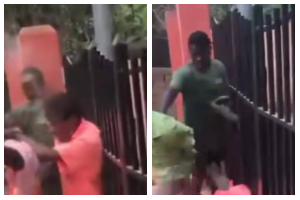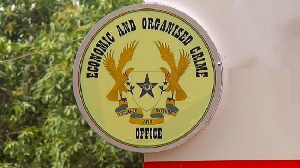On the hills of Abelemkpe, a surburb of Accra stands the quiet office of Interbeton BV., the Dutch company which hijacked the scandal-ridden $60 million GPHA contract through the back door. Inside this office sits a giant portrait of Ghana’s ‘Gentle Giant’ - President Agyekum Kufuor - a man who stands for zero tolerance for corruption.
Investigations have revealed that Interbeton BV, recently benefitting from an illegal tax exemption from the Ministry of Roads and Transport and the Ministry of Finance in respect of the $60 million GPHA project, has been handcuffed by the Auditor General and the Post Clearance Unit of the Custom Exercise and Preventive Service for violation of previous tax exemptions granted them by Parliament.
According to documents sighted by the Chronicle and confirmed by an Auditor General report, Interbeton has been cited for tax evasion in respect of the illegal sale of vehicles and equipment brought into the country by Interbeton BV. to execute a government contract for which reason Parliament granted them tax exemption in 1999.
In February 1999, the then Minister for Roads and Transport, E. K. Salia, sent a memorandum to Parliament seeking approval for tax/duty exemptions for the rehabilitation of phase 4 of the Kumasi-Yeji road.
The then minister, in his memorandum to Parliament, stated that “Honourable members are respectively invited to consider and approve tax /duty exemptions contained in the contract agreement for the rehabilitation of the phase 4 of the Gyato Zongo-Yeji road by Interbeton Bv”.
The then minister reminded Parliament that the government of Ghana had to honour its obligations under the contract with Interbeton BV. which stated that “no income tax levied or imposed by or in Ghana is applicable to payments”.
In the light of the above, the minister said that the project needed to be exempted from all taxes on the contractor and the sub-contractor’s profits, income tax for expatriate staff, taxes and duties on materials, equipment, plant and vehicles including spare parts, lubricants and fuel.
According to CEPS officials, by virtue of the fact that taxes on the above mentioned items and equipment were waived by Parliament, Interbeton BV was also obliged to send back the equipment after completion of the project.
“The rule is that if taxes are waived on these equipment, they have to be sent back after completion of the project. You are not allowed to sell these items in Ghana. If you decide to sell the items in Ghana the exemption is waived and you have to pay taxes on the sale”.
But there is documentary evidence that soon after Interbeton BV completed the project, they clandestinely began selling the equipment and pocketed the proceeds without paying the necessary taxes.
Last year, the Ministry of Finance, headed by Mr. Osafo Maafo instructed the Auditor General to conduct a special audit of the indebtedness of the government of Ghana to Interbeton BV.
The audit among other things, was to “determine the net amount payable to or recoverable from Interbeton BV by way of overpayments on government-awarded contracts and determine the tax liability of Interbeton BV in relation to withholding taxes, value added tax and possibly, import duties”.
The Auditor General’s report dated June last year, revealed that Interbeton BV’s indebtedness in respect of indirect taxes was ?730,436,604.
“The indebtedness resulted from short collection assessed on unauthorized disposals plus pecuniary penalties. This had prompted CEPS to send a monitoring team from the Post Clearance Unit to conduct further investigations after receiving the information on capital assets which had been disposed of without CEPS’ authorization” the report stated.
On May 30, last year Mr. W. K. Akpabey, the assistant commissioner/ auditor of CEPS wrote to the managing director of Interbeton BV. stating that the monitoring team form the Post Clearance Unit was to visit the company from June 03, 2002 to carry out audit of Interbeton’s equipment and motor vehicles exempted from duty/taxes.
“The review will specifically cover import transactions during the period of 1999 to date, specifically to determine the status of those equipment and motor vehicles imported and exempted of duty/taxes” the letter stated.
The CEPS team asked Interbeton to make available books, records and documents such as Import and Clearing documents (bills of entry, supplied Invoices, packaging lists, exemption letters), Purchase Ledger, Inventory/Assets Records, Disposal records and any other relevant books of account.
Mr. Akpabey slapped a 300% pecuniary penalty on Interbeton and gave the breakdown of the indebtedness as “Short collection - ?182,609,151, 300% pecuniary penalty - ?547,827,453”.
The CEPS letter warned Interbeton that whiles awaiting the audit review from the Post Clearance Unit and its outcome, “You should take steps to settle the short collection plus pecuniary penalty within 14 days of the date of this letter.”
When Chronicle contacted Interbeton BV. yesterday for their comments on the matter, the contract manager, Mr. Martin Egas apologetically admitted that the company had committed the offence but explained that it was a mistake on their part and that the company had been embarrassed by the incident.
“It was a mistake and we accepted it. We were embarrassed and so we took measures to prevent it from happening again.”
Mr. Egas said. He noted that perhaps the Interbeton officials who committed the offence were ignorant of the fact that it was unlawful to sell an equipment which had been exempted from duty/taxes by the government.
According to Mr. Egas, the company settled the bill on September 10, last year adding that the pecuniary penalty of 300% was later slashed down by CEPS.
SURPRISE It is recalled that it is the same Ministry of Finance which is in the center of a recent controversy for issuing another illegal tax exemption certificate to Interbeton BV contrary to constitutional provisions.
In a story published in the Chronicle two weeks ago, the GPHA boss, Mr. Ben Owusu Mensah, Dr. Richard Anane, the immediate past Minister for Roads and the Ministry of Finance were indicted for issuing another tax exemption certificate to Interbeton without seeking Parliamentary approval
General News of Friday, 6 June 2003
Source: Chronicle












